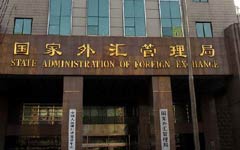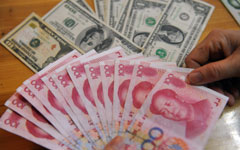Yuan takes another major step toward full convertibility
Updated: 2014-07-04 08:43
By Reuters (China Daily)
|
|||||||||||
Banks can now set their own exchange rates for the yuan against the dollar in over-the-counter transactions - another step toward freeing the exchange rate from government control.
Banks were previously required to price the yuan/dollar rate they offered retail clients within 3 percent in either direction of the Chinese central bank's daily middle rate.
|
 |
 |
Such equilibrium permits the central bank to free the yuan's exchange rate gradually without worrying about excessive volatility, he said.
The new rules do not apply to the yuan/dollar's main rate in the interbank market, which is subject to controls including the central bank setting a daily middle rate.
Under the new policy, effective immediately, banks can price OTC yuan/dollar exchange rates "in line with market supply and demand and without any restrictions", the PBOC said in a statement on Wednesday.
The move "is aimed at further perfecting the mechanisms to establish a market-oriented exchange rate for the yuan," it said.
However, the wholesale market that the banks trade in must still abide by the middle rate guidance rate. Because that primary market is an enormous source of foreign exchange supply and demand, posting around $15 billion in transactions every day, it will continue to exercise a strong influence on the retail market.
The world's second-largest economy is seeking to increase the use of the yuan in global trade and investment to reduce China's dependence on the US dollar. The move is also aimed to reduce the exposure to the economic policy decisions made by global financial institutions, in which Washington has a big influence.
Related Stories
S.Korea, China agree to launch Won-Yuan trading market in Seoul 2014-07-04 09:21
Chinese yuan exchange rate in equilibrium: report 2014-07-03 13:57
China signs RMB business MoUs with Luxembourg, France 2014-06-30 09:22
Globalized RMB to stabilize world economy 2014-06-28 13:52
China starts direct yuan-sterling trade 2014-06-18 17:04
Yuan on road to two-way volatility 2014-06-11 16:11
Today's Top News
China, Germany join hands to drive growth
Meet foreigner breed of workers
Product placement deal backfires
From Westlife to the East
Gambling costs World Cup fans their lives
US supports Ukraine's decision to suspend ceasefire
It's all about making a spectacle
China likely to see 7.5% growth in second quarter
Hot Topics
Lunar probe , China growth forecasts, Emission rules get tougher, China seen through 'colored lens', International board,
Editor's Picks

|

|

|

|

|

|





